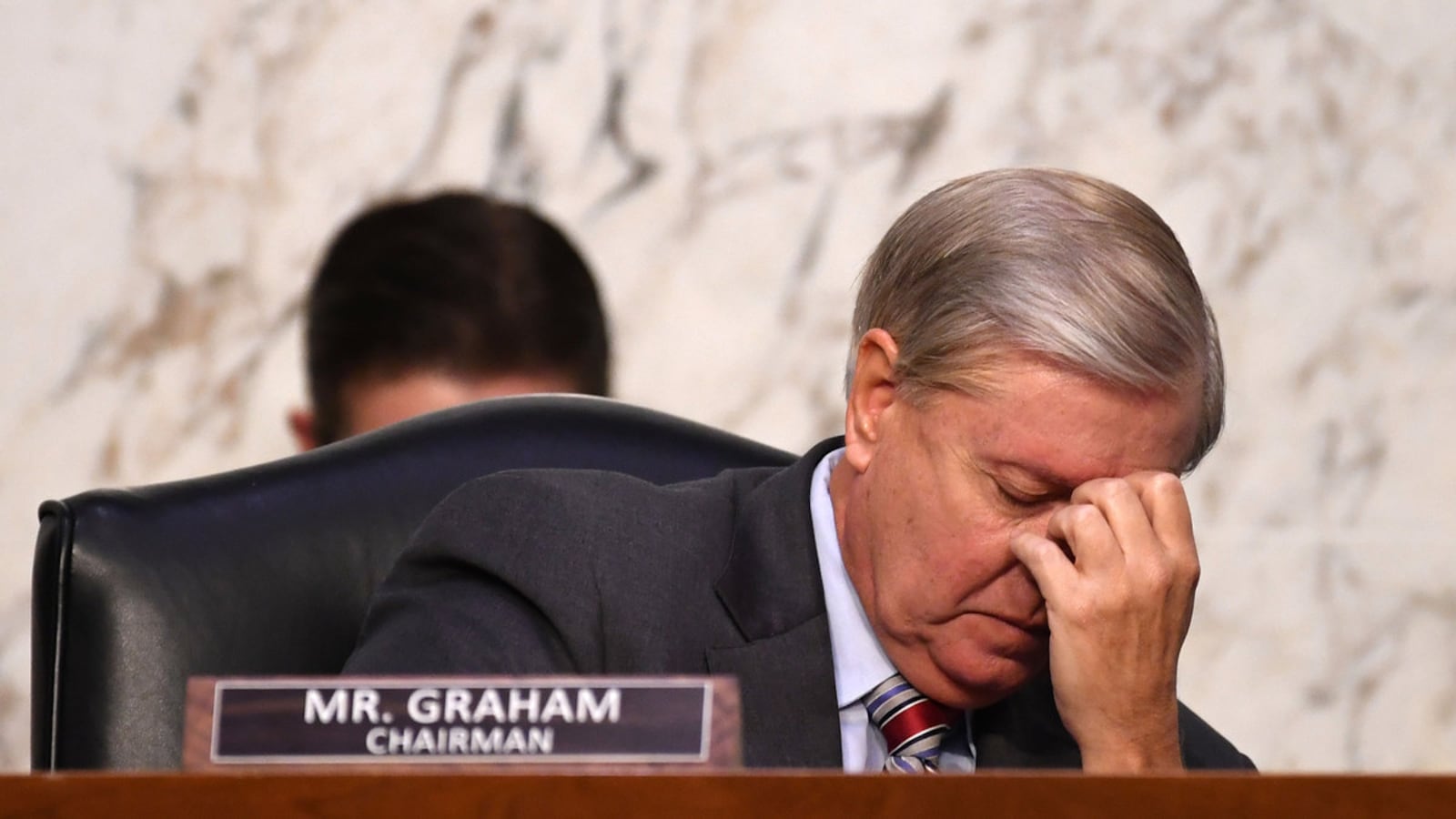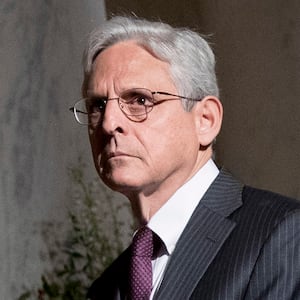What first seemed like a petty partisan power play in the U.S. Senate has escalated into a setback for President Joe Biden’s Department of Justice before it even really leaves the starting block.
At the center of the imbroglio is a figure who is accustomed to being collateral damage of partisan warfare on Capitol Hill: Merrick Garland.
The former federal judge and Supreme Court nominee is Biden’s pick to serve as attorney general—but unlike other key Cabinet appointees, he has yet to receive a confirmation hearing in the Senate Judiciary Committee for his nomination to lead the Department of Justice.
That’s because it took the parties’ Senate leaders weeks to agree on how to divide resources and set the rules in the evenly split Senate. During that time, Democrats were technically in the majority, but the last session’s rules were still in place, meaning Republicans ran the committees. So when the incoming Judiciary chairman, Sen. Dick Durbin (D-IL), wanted to schedule a hearing for Garland, he first had to ask the permission of the outgoing chairman, Sen. Lindsey Graham (R-SC)—and Graham said no.
With the impeachment trial of former President Trump slated to take up at least all of next week, and the chamber scheduled to be in recess the following week, it’s possible that another month could pass before Garland takes over as attorney general, said Sen. Chris Coons (D-DE), a member of the Judiciary panel and a close ally of Biden.
That possibly lengthy setback in installing leadership at the department is especially troubling to Democratic lawmakers and outside advocates—not only because they’re itching to get started on a new DOJ agenda, but because of the acute importance of its business at the moment. Among many other things, for example, the department is investigating and prosecuting the Jan. 6 insurrection at the Capitol. It’s an urgent task in the eyes of Biden and his allies.
“They are trying to effectively investigate and respond to domestic terrorism,” Coons said of the Justice Department on Thursday. “There are all of the usual Department of Justice burdens, and there are new filings and positions and cases of every kind and in every district… I mean, from immigration to gun violence to policing reforms, there are policy initiatives where there’s work to be done.”
“There is lots to do,” Coons told The Daily Beast in an interview. “To have our country’s chief legal officer sidelined for weeks is needlessly harmful.”
The man tasked with holding that job, Garland, is a favorite among Democrats: they still haven’t forgotten Sen. Mitch McConnell’s (R-KY) outright refusal to hear his nomination to the Supreme Court in 2016, and that history has only added to their frustration about the holdup in his latest nomination.
But the central frustration stems from the fact that Biden’s chosen team will be iced out of Main Justice during a pivotal moment for the agency. Many believe Garland is especially well-suited to this moment. As a former DOJ official himself, Garland oversaw the federal investigation into the 1995 Oklahoma City bombing and the prosecution of its perpetrator, Timothy McVeigh. Durbin has said “there is no person better qualified” to lead the investigations and prosecutions stemming from Jan. 6 than Garland.
On Capitol Hill, the dust-up also is disheartening Democrats as they retake the reins of the Judiciary Committee, after four years in which the panel served as the launching pad for Trump and McConnell’s bid to reshape the federal judiciary in a markedly more conservative direction. They churned 234 judicial nominations through the committee in that time, and Democrats are anxious to start making a dent with Biden’s own selections.
While the AG nomination has no bearing on the court project, it’s been an ominous way to begin the task at hand for Democrats and for Durbin, who is replacing Sen. Dianne Feinstein (D-CA) as chairman. Graham is ceding the top spot on the GOP side to Sen. Chuck Grassley (R-IA), so he will no longer be his party’s chief instigator on judicial matters, but his final move as chairman has made some Democrats concerned about the path forward for the next two years.
“It’s a bad first step,” Sen. Richard Blumenthal (D-CT), a member of the panel, told The Daily Beast on Tuesday. “It’s a bad way to begin the journey.”
The Senate Judiciary Committee, considered the chamber’s most prestigious, can move at a more languid pace than most. While nominees for critical national security posts are typically confirmed within days of a new administration—Biden’s choices to lead the Pentagon, State Department, and Office of the Director of National Intelligence have all been in place for weeks—there has in the past been a 28-day period between the submission of an AG nominee’s paperwork and a Judiciary hearing.
After Garland submitted his paperwork last week, Durbin would have been able to schedule a prompt hearing for him—if the power-sharing agreement were not delayed and Graham were not in charge of the committee. So Durbin had to appeal to Graham, arguing in a letter that “expediting Judge Garland’s confirmation is particularly urgent in the aftermath of the January 6 insurrection.”
In response, Graham said the request was “highly unusual,” claiming Durbin wanted senators to “rush through” Garland’s hearing before Trump’s impeachment trial. “An impeachment is no small thing,” admonished Graham. “It requires the Senate’s complete focus.” On Tuesday, a defiant Graham—who said that he likes Garland and may vote in his favor—told reporters, “I didn’t choose to do impeachment, they did.”
Democrats find it rich that Graham, who just orchestrated the fastest Supreme Court nomination in history when he was chairman, is now saying it’s time to pump the brakes. “The speed with which Judge Barrett, now Justice Barrett, was confirmed suggests the committee is fully capable of doing this in quick succession,” said Coons.
It also rankles Democrats that in other committees, the top Republicans, though still nominally in charge, acquiesced to nominations hearings—or in some cases, gave Democrats actual control. “There’s no reason that the committee couldn’t have moved on this quicker save for pure partisan politics,” said Jim Manley, a former top adviser to the former Democratic leader, Sen. Harry Reid (D-NV). “Other committees found themselves able to report out nominees, yet Sen. Graham found for some strange reason unable to report it, to deal with the Merrick Garland nomination in expeditious fashion.”
Democrats on the panel have suggested that they have the ability to charge forward with hearings for Garland in the coming weeks, despite the impeachment trial and the scheduled recess.
Asked by The Daily Beast on Thursday what options were available, Durbin declined to say, only offering that he wanted to speak with Grassley.
Meanwhile, outside advocates who are anxious for Democrats to get to work on the panel after watching Trump’s DOJ take actions they detested, and witnessing the GOP’s parade of judicial nominees, are urging them to move forward with all possible speed.
“There is a real urgency” to move on Garland and to get off on the right foot for judicial confirmations, said Lena Zwarensteyn of the Leadership Conference on Civil and Human Rights, a nonprofit advocacy group. The group’s CEO, Vanita Gupta, is a Biden pick for associate attorney general.
“Making sure there is a prompt hearing for Judge Garland,” said Zwarensteyn, “is incredibly important in order to start really getting, I don’t want say back on track, but getting us to fix problems we have.”







